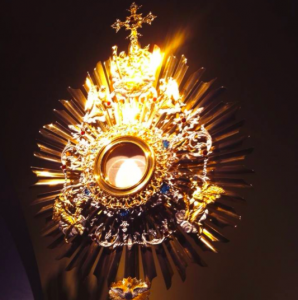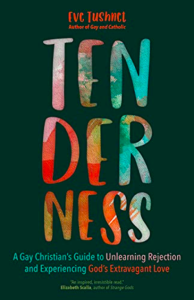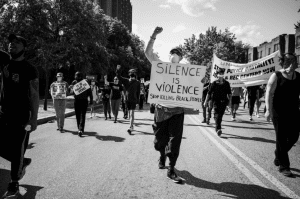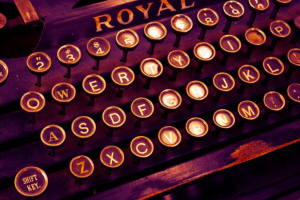August has been a busy month, and I haven’t had time to begin writing the new series I have planned. In lieu of that, here is another selection from the book I am currently working on, this time from the epilogue.
§§§

Our identity is in Christ, see. No, we don’t feel the need to bring that up with heterosexuals, but why would we? Straight people don’t invest our whole identity in our sexuality! I mean, yes, we talk pretty freely about our feelings for the opposite sex, or about whether our hobbies are manly enough, or about our relationships, but come on, why wouldn’t we talk about those things? Everybody does. It doesn’t mean we have a whole straight identity we filter everything through. Cisgender and heterosexual experience in art and entertainment, in politics and society, in thought and culture, that stuff’s just—I mean, it’s how most people are. It isn’t political to acknowledge that. Why do you have to make such a fuss about everything? Our use of words like “straight” is normal, come on! We shouldn’t be the ones who have to change! You’re the freaks!
We freaks have something to offer you, something you probably couldn’t get by yourselves: a hand down from that pedestal. Because the truth is, it has nothing to offer you. The feeling of being normal, and therefore the norm, is comforting, because it’s familiar. But it won’t actually furnish you with any insight or strength or joy or, well, anything worth having. We can tell you that, because we know what life is like without it. Queer people can perhaps see it better than anyone, since we usually spend at least part of our lives in the closet, and have a direct experience of the difference between what life is like when people think you’re straight and how different it often becomes when they find out you’re not. And we can see how insecure the pedestal seems to make you. When merely being aware of people who aren’t also on the pedestal makes you bullies in your bad moments, and patronizing in your better ones, I think the pedestal might be a bad place.
Just to be clear, I do not want to be on the pedestal either. That’s partly what I meant when I said I’m over pinning my hopes on getting straight Catholics to accept me; it was an attempt to participate vicariously in the pedestal, like I thought I was supposed to. But it doesn’t seem to make anybody better to be the center. And anyway, I already have problems. I don’t need those problems too. Gay problems form a full and demanding schedule; a thoroughgoing agenda, if you will.
When your identity and self-worth are, in any degree, tied up with being the norm by which other people should be defined, that is damaging for you, as well as your neighbor. It’s a shaky foundation, because it’s a false one. St. Bonaventure defined God as a circle whose center is everywhere and whose circumference is nowhere, and the book of Genesis defined man as the image, in Greek the ikon, of God. If every human being is an ikon of God then we are all at the center. When you try to redefine other people to bring them under your control, you are defacing one of the ikons that is meant to show you something about God that you can’t see in the mirror.
* * * * *
To my queer Christian audience, wondering about the title of this epilogue [“Queer Catholics—A Future”]: yes, we have a future. Of course we have a future! It took me so long to see it. I understand if it looks hopeless. I can only really speak from my own experience, but I’ve got a strong suspicion that nine-tenths of all our angst over exclusion and homophobia is rooted in the anxiety that they might be right. After all, we’ve all grown up in a culture (both secular and religious) that caters first and foremost to heterosexuals, that treats everything about them as the default—and left us feeling at fault for not being able to access that experience.
Breaking free of that mindset is hard. I still find it difficult to trust that God loves me, and likes me. And it’s a lot harder for those of us who have traditional beliefs about sexual mores, little though some of us may like to admit that. Because it is very threatening to admit that you hold beliefs which are easily twisted into something unhealthy, or worse, something that can be used as a tool to injure other people. But we won’t protect anybody by pretending that these risks aren’t there. We have to grapple with the possible costs of our convictions, for others as well as ourselves, if we want to take those convictions seriously; and we need to do it because the dangers are real, not because it looks better to non-Catholics. It might even be that many people cannot swallow this stuff, unless they have first received the promise that “if they drink any deadly thing it shall not hurt them.”
I’m surprisingly optimistic about our future as queer Christians, living our lives and taking care of each other. It’ll be rough. It always is. There is no one who can live any kind of Christian life without suffering; and being queer always means being different, and that can carry anguish with it even in accepting societies. But if there’s anything I have observed about LGBTQ people in the twenty years I’ve known I was one, it’s that we are tough. I don’t think I have ever met a queer person who did not strike me as a survivor.
There’s a famous story about St. Lawrence, a Roman deacon martyred in the third century. He was quietly approached by the prefect of Rome, who offered to leave him be if he handed over the treasure of the church; St. Lawrence asked for three days to collect it. The request was granted. Three days later, he appeared with a great mass of the city’s poor, telling the official that they were the Church’s treasure. Unamused, the prefect sentenced him to be roasted alive. At one point he reportedly told his executioners: Manduca, jam coctum est, which roughly translates to, “It’s done, have a bite.” That magnificent sass has exactly the same spirit I see in queer people. We get hurt and bloodied, and we smear the blood on our mouths like lipstick and hold our heads high. And I think God likes that.












